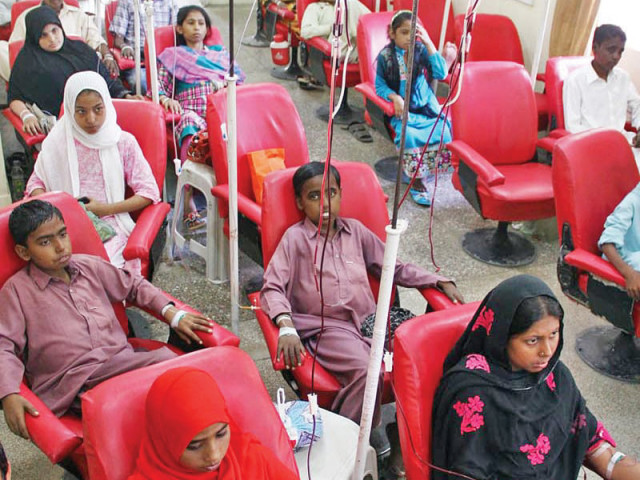Combating Thalassaemia: ‘Govt should implement bill on thalassaemia’
More than 8,000 children are born with thalassaemia every year.

Thalassaemia patients are being treated at the Fatmid Hospital, Karachi, on World Thalassaemia Day. PHOTO: ONLINE
“The government should ensure that before marriage both the boy and the girl get a certified thalassaemia report and attach it to their nikah documents,” he suggested. Besides, the person administering the nikah should ask for the copy of the thalassaemia report of the boy and the girl before solemnising the nikah as a gesture of fulfilling social, religious responsibility, he added.
He stressed the need to establish state-run diagnosis centres at the district levels, urging the government to take measures to implement the bill on thalassaemia. Prevention is better than cure and early diagnosis is essential in the process, he added.
As many as 100,000 children are suffering from thalassaemia major throughout Pakistan, while more than 10 million are afflicted with thalassaemia minor, according to Dr Naeem.
He lamented the fact that the children who fall prey to the blood disorder become continually dependent on blood donation. With more than 8,000 children who are born with thalassaemia every year requiring an average of two bottles of healthy blood per month, he stressed that the country faces a challenge.
Marking the World Thalassaemia Day on Thursday, Dr Naeem applauded the efforts of the Blood and Drugs Donation Society in Sukkur. The centre was established in 1990 and is the second biggest centre of the country today after the one in Karachi. More than 8,000 registered children are provided 4,438 bottles of fresh and healthy blood. These children belonging to different parts of upper Sindh, southern Punjab and some parts of Balochistan, not only get healthy blood twice a month but also other essential treatment free of cost, he explained.
He further informed that 131 children registered at the centre belong to Sukkur, 74 are from Rohri, 47 from Pano Aqil, 73 from Ghotki, 38 from Mirpur Mathelo, 91 from Shikarpur, 55 from Larkana, 63 from Jacobabad, Kashmore and Kandhkot, 153 from Khairpur, 16 from Naushero Feroze, 11 from Rahim Yar Khan and Khanpur, and 36 from Ubauro.
He announced that the centre is going to celebrate a fun day on May 10 for the affected children, which will include a musical show, painting contests and magic shows.
Thalassaemia is a genetic, hereditary disease, which is passed on to the children from the parents. Expressing anxiety over the spread of thalassemia in Pakistan, Dr Naeem cited inter-family marriages contributing to 44 per cent of the cases. He explained that the disease causes acute shortage of haemoglobin in the children and they need fresh and healthy blood every month for survival.
Published in The Express Tribune, May 9th, 2014.



















COMMENTS
Comments are moderated and generally will be posted if they are on-topic and not abusive.
For more information, please see our Comments FAQ